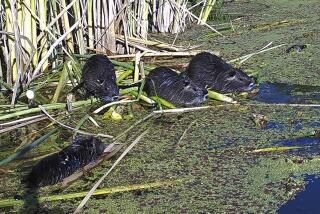Poison Grain Keeps Underground Squirrels Under Control at Beach
- Share via
Wondering where most of the ground squirrels have gone at San Elijo State Beach?
They are underground, of course, but not playing or hibernating or planning a migration to some better home.
They’re dead.
An estimated 80% of ground squirrels at the beach were poisoned in late July under a California Department of Parks and Recreation effort to keep them from bothering campers and to prevent the tunneling rodents from further eroding the area’s bluffs and undermining park facilities.
“Generally, the squirrels were a biological and environmental and facilities problem that was getting worse fast,” said Bill Tippets, a senior resource ecologist with the Parks Department. “We had to take them down to a reasonable number.”
The beach’s ground squirrel population was cut from an estimated 500 to less than 100, Tippets said.
“The population is low, but they’re still there,” he said. “We’ve had no (recent) complaints from the public” about the poisoning program or squirrels bothering campers.
The ground squirrels, which are considered pests under state law, were poisoned with oat grain laced with the chemical diphacinone. The tainted grain was placed in small bait stations made of narrow piping for two weeks in late July.
After eating the grain, the squirrels become lethargic and, fearing vulnerability from predators above ground, instinctively return to their burrows, where they die, Tippets said.
“Something had to be done. There were just too many of them,” he said. “It was an unnatural situation: they can be aggressive because they have learned to beg and people feed them. Campers were saying the squirrels were infesting or invading the campsites to the point that they weren’t able to use them.”
The department routinely evaluates the pest populations at state beaches and parks and periodically uses poisons to reduce their numbers when they become a nuisance, Tippets said.
Overpopulation of ground squirrels and other animals considered pests occurs because of the absence of predators such as eagles, hawks, foxes and coyotes and because of the availability of nonnatural food sources such as handouts from people.
The upsetting of the ecological balance creates an environment in which ground squirrels proliferate to an abnormally high density, and, in the case of San Elijo State Beach, creates the need to reduce their numbers.
Diphacinone, which is similar to rat poison, is approved by the state for pest control purposes. The chemical is an anti-coagulant that affects a body’s ability to form blood clots. A ground squirrel will die after eating several batches of diphacinone-tainted grain.
The poison has been used at other state parks in San Diego, but this was the first time it was used at San Elijo to control a pest population, Tippets said.
Park officials will monitor the squirrel population to determine whether additional poisoning will be needed.
Enough of the rodents remain so that San Elijo will have a thriving ground squirrel community, Tippets said.
Park officials never considered poisoning all the squirrels, he added.
“Why would we consider eradication? Just because one link in the food chain (predators that prey on the squirrels) is gone doesn’t mean that another group can’t exist. The squirrels have a right to be there, but their numbers have to be controlled to a reasonable level.”
At San Elijo, the ground squirrels burrows were undermining the bluffs and park facilities, such as parking lots, comfort stations, outdoor amphitheater and other structures, Tippets said. Minor repair work will be needed, he added.
“These squirrels are active burrowers, and they were causing significant bluff erosion,” he added. “It is not that bad now, but it would be if they were allowed to continue to grow.”
The Parks Department received a few complaints that the poisoning was inhumane, but it was not feasible to trap and move the squirrels to a new site, Tippets said. Also, a legal birth control agent like one that was used to reduce the pigeon population in Balboa Park in 1986 isn’t available for squirrels, he added.
Several San Diego animal advocate groups said they were unaware of the squirrel-control program or were unavailable for comment.
The bait stations were above ground, but the openings were too small for children or pets to reach the tainted grain, Tippets said. The stations have since been removed and squirrel-control signs posted temporarily have been taken down.
San Elijo State Beach in Cardiff has 171 campsites on 42 acres.
More to Read
Sign up for Essential California
The most important California stories and recommendations in your inbox every morning.
You may occasionally receive promotional content from the Los Angeles Times.













